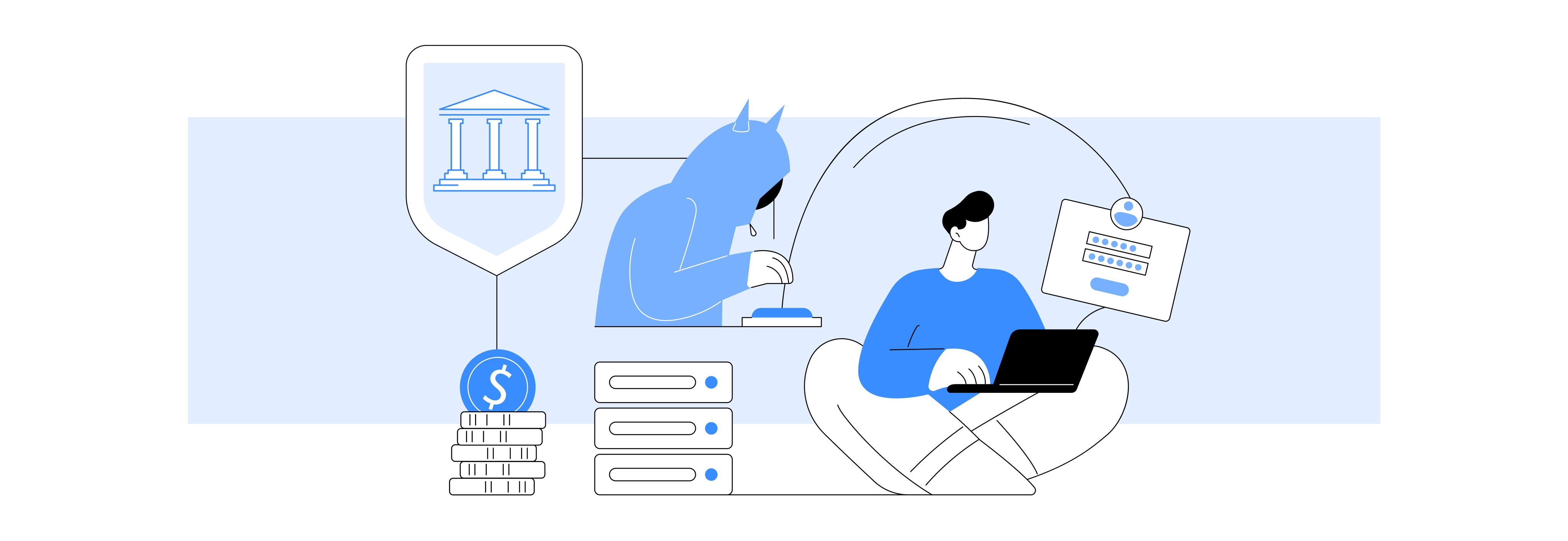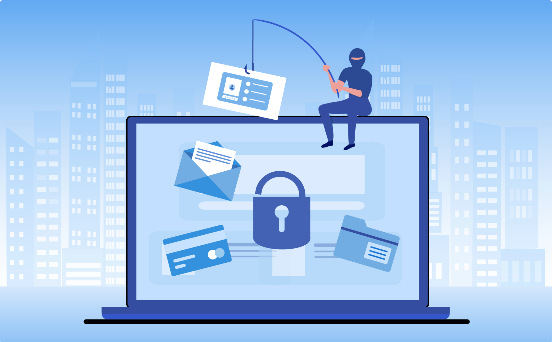How to report a scam with your bank
Home > Online Safety > How To Report a Scam to Your Bank
Summary
Financial scams are on the rise, and it’s crucial to report them to your bank. Learn how to identify common scams, such as phishing and robocalls, and the steps to report them to authorities. Staying informed and vigilant can help protect your finances and personal information.

If you've experienced a recent bank scam, you're not alone.
Over half of all financial institutions have identified increased fraud attempts this year. These attempts range from check fraud to identity theft and cost billions of dollars each year. The vast majority of scams begin with a single, authentic-looking email.
If you suspect fraud, the first step is to report the scam to your bank or financial institution. For some, the process may feel embarrassing or uncomfortable. After all, no one wants to admit they fell victim to fraud. However, a report is often the best way to rectify the problem and increase the chances of having your funds returned to you.
In this guide, we’ll share how to report a scam to your bank for further investigation. We’ll include tips for reporting other types of scams, too. Continue reading to take the first steps toward recovering your lost funds.
The most common financial scams
It’s easy to fall for one of the most common financial scams. They are designed to trick you into relinquishing personal information, such as passwords or Social Security numbers. Scam emails, phone calls, and websites look and sound legitimate. Some even utilize AI and other technologies to make a situation seem more authentic or heightened.
We’ll briefly describe a few of the most common financial scams so you can identify them when you see them:
Phishing scams
Phishing emails are fraudulent emails or messages that appear to be from legitimate organizations. They often include links to legitimate-looking websites. The sites prompt users to provide sensitive information like passwords or financial details.
Debt collection scams
Scammers pose as debt collectors, often over the phone. They use aggressive tactics to coerce individuals into paying non-existent debts. These scammers often threaten legal action or arrest.
Government impersonation scams
Government impersonation scams are another type of phone scam in which scammers pretend to be government officials, such as IRS agents or law enforcement. They intimidate victims into providing personal information or making payments for fake fines or fees.
Robocall scams
Automated phone calls deliver deceptive messages or impersonate trusted people. They try to trick individuals into disclosing personal information or making payments.
Social engineering scams
These are scams that manipulate victims through psychological tactics. They often exploit emotions like fear to gain access to confidential information or assets. For example, a scammer might impersonate a grandchild and ask for bail money.
Advanced fee scams
Scammers promise a large reward, like a lottery win or inheritance, in exchange for an upfront fee or payment. However, the upfront payment is never reimbursed, and there is no reward. These might be conducted over the phone or by email.
Deceptive business scams
Fraudulent businesses offer misleading products or services. They attract victims with false claims and often fail to deliver on their promises. Some might even take money without providing anything in return.
These types of scams are becoming more common on new platforms like TikTok Shop and Instagram Shops. Businesses steal legitimate product images from other users, charge high prices, and drop-ship a cheap imitation. Just as frequently, these illegitimate businesses disappear with your money.
How to report a scam to your bank
Nearly every bank has a customer service or fraud hotline. You can find this number online, in your banking app, or even printed on your bank card.
You’ll be prompted to explain the situation. Using some of the language above could help expedite the process. The more information you have, the better. Share any information you think was compromised and identify any suspicious or fraudulent transactions posted to your account.
If your account has been compromised, your bank may temporarily freeze or block the account. This step can help to prevent further unauthorized use. You’ll likely be issued new cards and account numbers at that time.
Continue to monitor your account and report any more fraudulent activity as it comes in.
How to report a scam email
If you receive a scam email, do not click on any links or open any attachments. You may wish to document it by taking a screenshot.
Most email clients have a built-in “report spam” or “report phishing” feature. Click that button and the email will be reported and quarantined within your inbox.
If the email seems malicious, you may wish to forward it to the appropriate authorities:
- Anti-Phishing Working Group (reportphishing@apwg.org)
- Cybersecurity and Infrastructure Security Agency (phishing-report@us-cert.gov)
- The Federal Trade Commission (reportfraud.ftc.gov)
If you have already interacted with the email and see fraudulent activity, report the scam to your bank as soon as possible.
How to report a phone scam
You can report a phone scam to the Federal Trade Commission at reportfraud.ftc.gov. You can also report it to the Federal Communications Commission at fcc.gov/complaints.
Consider contacting your phone service provider so they can help you block the number.
How to report a scam company
Collect as much information as you can about the company. This might be tricky, as illegitimate companies tend to “disappear.” They may take down their website and disable their email address. Even so, providing this information can help authorities.
Report the company to the Federal Trade Commission at reportfraud.ftc.gov. For online fraud, you can report the company to the Internet Crime Complaint Center (IC3) at ic3.gov. As a further step, you can report the company to the Better Business Bureau. This helps warn others from purchasing from the scammer.
Discover peace of mind with Raisin
Staying safe online is as important now as ever. Online scams continue to become more elaborate with emerging technology. Head to our online safety guides to learn more and stay safe online.
Related Content
The above article is intended to provide generalized financial information designed to educate a broad segment of the public; it does not give personalized tax, investment, legal, or other business and professional advice. Before taking any action, you should always seek the assistance of a professional who knows your particular situation for advice on taxes, your investments, the law, or any other business and professional matters that affect you and/or your business.


